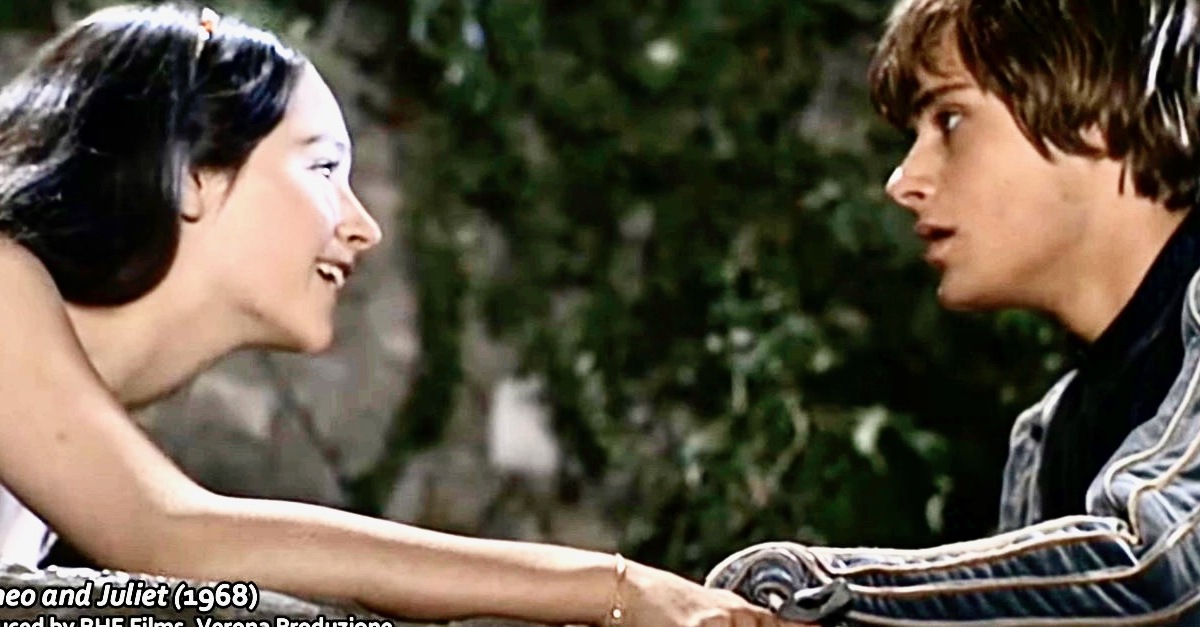
Olivia Hussey and Leonard Whiting are shown in a clip from Romeo and Juliet, Paramount Pictures, 1968.
Just one day before the end of a new statute of limitations would expire and more than five decades after the facts are alleged to have happened, actors Olivia Hussey and Leonard Whiting sued Paramount Pictures for illegally using nude images of them in the 1968 Franco Zeffirelli Oscar-winning film Romeo and Juliet.
Hussey, now 71, and Whiting, now 72, had been 15 and 16 years old, respectively, at the time the now-classic Shakespearean film was filmed. In their complaint filed Friday in Los Angeles Superior Court, the two say that Zeffirelli deceived them and that Paramount “knew or should have known images of plaintiffs’ nude bodies were secretly and unlawfully obtained during the performance.”
Zeffirelli, an Italian filmmaker known for his lush screen adaptations of classic operas, died in 2019 at the age of 96.
In their complaint, Hussey and Whiting say that Zeffirelli told them there would be no nudity featured in the film and that they would wear flesh-colored undergarments during the single bedroom scene. However, they say that on the morning of the shoot, the director insisted that they act in the nude with only body makeup on or “the picture would fail.” According to court documents, the two say that Zeffirelli threatened that if they did not do the scene without clothing, they would “never work in any profession, let alone Hollywood.”
In the film, Whiting’s bare buttocks and Hussey’s bare breasts are shown during a scene. The actors say the footage was captured “secretly” and without their permission.
The complaint asserts that Paramount “ratified [Zeffirelli’s] … unlawful conduct by repackaging what is essentially pornography and evidence of a crime and then reselling that poisonous product for a profit” over both actors’ ongoing and repeated objections since 1968.
The two plaintiffs say the studio’s actions amount to sexual abuse, sexual harassment and fraud and are seeking damages in excess of $500 million to compensate them for emotional distress, severe mental anguish, medical expenses, and loss of earnings that continue to this day. They also ask for punitive damages.
California’s 2020 Child Victims Act was passed in the wake of the widespread sexual abuse scandals in the Roman Catholic Church as well as the highly-publicized case of USA Gymnastics doctor Larry Nassar‘s sexual abuse of over 100 girls. The law temporarily lifted the normal statute of limitations for sexual abuse so that victims who were abused as children could file cases well into adulthood.
Among other things, the law allowed for an umbrella three-year period from January 2020 until Dec. 31, 2022 in which any claimant could file a lawsuit for childhood sexual assault regardless of what statute of limitations would have applied to their case otherwise.
Hussey and Whiting’s case was filed Friday, Dec. 30, 2022 — the last possible day on which it could have been filed. California has seen a barrage of similar litigation in the days leading up to the deadline, including a 65-year-old Texas woman’s case against Aerosmith frontman Steven Tyler over sexual encounters in the 1970s that allegedly began when she was 16 years old.
Under one of the California statutes applicable to the Romeo and Juliet actors’ complaint, a defendant would be civilly liable for if that person “has made sexual advances, solicitations, sexual requests, demands for sexual compliance by the plaintiff, or engaged in other verbal, visual, or physical conduct of a sexual nature or of a hostile nature based on gender, that were unwelcome and pervasive or severe.”
Should the Hussey and Whiting lawsuit move forward through discovery, statements Hussey made in 2018 about her memoir, The Girl on the Balcony: Olivia Hussey Finds Life After Romeo a Juliet, could cast doubt on the narrative put forth in the complaint against Paramount.
At the time, Hussey specifically discussed the nude love scene with Variety. Hussey described Zeffirelli as a “genius” who she “loved,” and said the director had a practice of “let[ting] that actor do what they felt.”
Hussey also described the scene to Fox News as having been done “very tastefully,” and contextualizing that onscreen nudity was far more common in Europe at the time than it had been in the U.S.
“Nobody really thought much of it,” Hussey said during an interview and continued to explain that during the filming process, the set had been closed and only a few members of crew that had “become a big family” were present.
“It wasn’t that big of a deal,” Hussey said in 2018 about the filming process, noting that “Leonard wasn’t shy at all!”
“In the middle of shooting, I just completely forgot I didn’t have clothes on,” she also said.
Hussey’s public statements could cast doubt on whether sexual conduct during filming had been actionably “unwelcome.” Still, given that both Hussey and Whiting had been below California’s current 18-year age of consent for sexual activity when Romeo & Juliet was filmed, their claims may well make it to a jury.
Counsel for the parties did not immediately respond to request for comment.
Editor’s note: Law&Crime does not typically name people who say they have been sexually abused unless they come forward publicly, as Hussey and Whiting have.
[screengrab via YouTube]